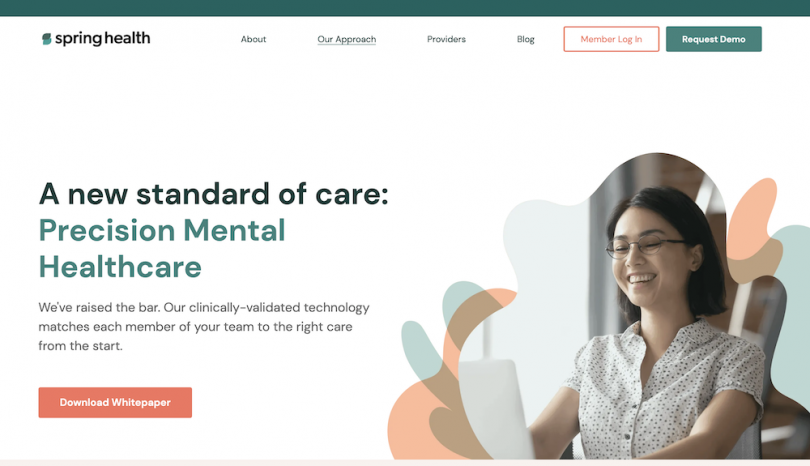Yale alumna becomes youngest female unicorn CEO
April Koh ’16 and Adam Checkroud GRD ’18 have created an entrepreneurial unicorn, or private company valued at above $1 billion, that aims to improve the delivery of mental healthcare services.

Creative Commons
April Koh ’16 is the CEO and co-founder of Spring Health, a health startup with a valuation of more than $2 billion. At 29, she is the youngest female leader of a multibillion-dollar startup.
As an undergraduate at Yale, Koh witnessed her roommate suffer from an eating disorder. Her roommate was taking antidepressants but had to wait weeks before receiving treatment at a clinic. In her efforts to help find treatment options, Koh came across a peer-reviewed research paper by Adam Chekroud GRD ’18 that detailed how machine learning can outperform health care providers in matching patients to a care plan personalized to their needs. That paper laid the foundation for Spring Health.
John Krystal, Professor of Translational Research and Chair of Psychiatry at Yale, served as a mentor for Chekroud when he was a graduate student in the Department of Psychology.
“Chekroud is incredibly bright as well as enormously creative and effective,” Krystal said. “Some of Chekroud’s work involved the application of machine learning (artificial intelligence) techniques to the analysis of large antidepressant clinical trial datasets. Chekroud’s work was some of the earliest and best work suggesting that one could predict antidepressant outcome overall and, importantly, predict the outcome to different classes of antidepressant medications.”
Inspired by his findings, Koh cold-emailed Chekroud to set up a meeting with him. The two later teamed up with another Yale undergraduate to found Spring Health, with the goal of improving the process of patient matching to particular treatments. Over time, they built a tele-mental healthcare system around a personalized healthcare strategy to provide mental health care that is both efficient and effective.
Their concept earned the duo the $25,000 Thorne Prize for Social Innovation in Health or Education in 2016, a prize awarded by InnovateHealth Yale, a social entrepreneurship program at the School of Public Health. The award provided seed capital to Spring Health, connections to its mentors and advisers and recognition as a compelling and promising social entrepreneurship venture.
“I always promoted health equity as a defining concept of InnovateHealth Yale and the reason I founded the initiative,” said Martin Klein, founder of InnovateHealth Yale. “In my talks and in my meetings with students, I encouraged them to create digital health solutions that prioritized low-income groups in the U.S. and low- and middle-income countries. I welcome the emphasis on digital health equity and hope both students and the market will recognize that we cannot truly advance as a country and global exemplar until we place the same emphasis on meeting the needs of all people as we do on maximizing profit for the few.”
InnovateHealth was founded on the premise of providing students with the space, resources and mentors to create innovative solutions. Spring Health accomplishes this mission by addressing national shortages in the access to any form of mental health care, especially access to high quality care.
Teresa Chahine, lecturer in social entrepreneurship at Yale School of Management, believes that digital health solutions hold great promise, but there is still a need to mobilize digital solutions that treat the root causes of social and environmental determinants of health.
“Apprentice with the problem,” Chahine said. “Start with a problem that you care about and then come up with a solution. In order to solve a problem you need to have first experienced it.”
Chahine advises all students who are interested in health innovation to take advantage of the diverse courses offered across campus and meet students with different backgrounds, or get involved with Tsai CITY.
Chahine teaches a course called Social Entrepreneurship Lab, which is a practice-based class for aspiring social entrepreneurs. It offers students from across campus the opportunity to work on a social challenge of their choice and provides a space to experiment and fail.
“In my experience it is often helpful to build a network of advisors and supporters when you are getting started,” Krystal said. “Yale is a special community that brings people with diverse backgrounds and talents together in exciting new ways. The important thing is to reach out and not wait for people to come to you. The Office of Cooperative Research is a good place to start… It was helpful in organizing activities where April and Adam could present their ideas and generate small amounts of funding for their company. OCR also developed patents that emerged from Adam’s graduate work and licensed those patents to Spring Health.”
According to Director of InnovateHealth Yale Fatema Basrai, the organization offers mentorship for students working on public health innovations. She emphasized that Tsai CITY and other partners of the Yale Entrepreneurship Collaborative have multiple mentorship resources that students can use.
Chekroud encourages other Yale students to become social entrepreneurs and commit to creating novel technologies out of their ideas.
“Do it!” Chekroud said. “Being a student is the lowest risk time in your life to try and found a company.”
At 29 years old, Koh became the youngest American CEO of a private startup company valued at over $1 billion.







